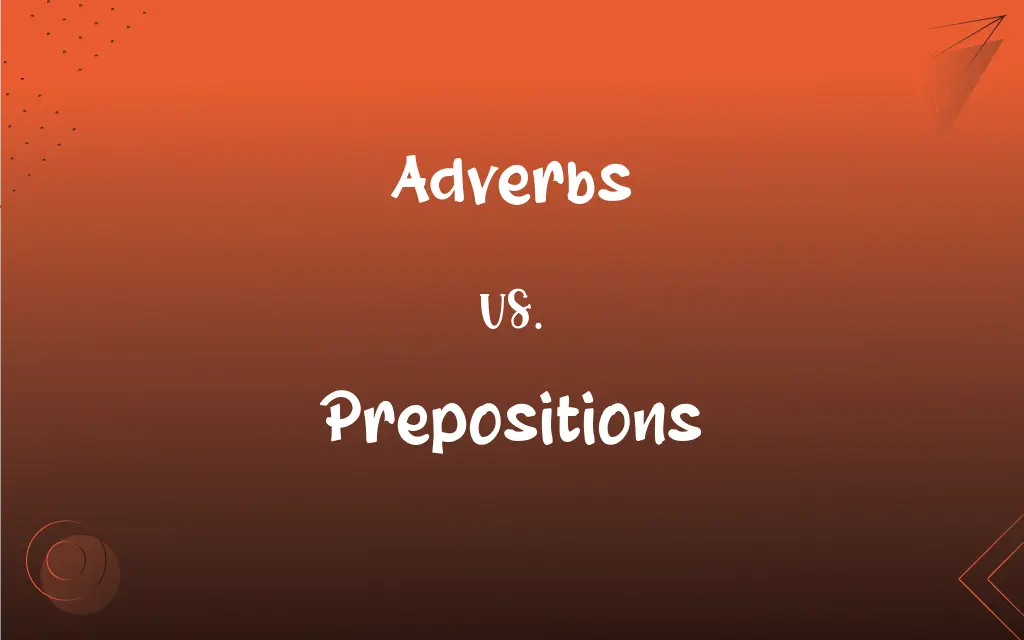Adverbs vs. Prepositions: What's the Difference?
Edited by Janet White || By Harlon Moss || Published on December 20, 2024
Adverbs modify verbs, adjectives, or other adverbs to describe how, when, where, or to what extent, while prepositions show relationships between nouns or pronouns and other words, indicating direction, time, place, or manner.

Key Differences
Adverbs are used to describe how, when, where, and to what extent an action occurs, often ending in '-ly'. Prepositions, however, are used to establish relationships between nouns or pronouns and other words, indicating direction, location, or time.
An adverb can modify verbs, adjectives, and even other adverbs, adding more detail to a sentence. Prepositions typically precede nouns or pronouns to form prepositional phrases, clarifying the context of an action or state.
Adverbs can be placed in various positions within a sentence, impacting the emphasis. In contrast, prepositions are usually fixed in their position, immediately before their objects.
Examples of adverbs include words like 'quickly', 'silently', and 'very'. Prepositions include words like 'in', 'on', 'at', and 'by'.
The role of adverbs is to express the manner, degree, frequency, or time related to the verb. Prepositions, on the other hand, link phrases to the rest of the sentence, showing relationships such as location or time.
ADVERTISEMENT
Comparison Chart
Function
Modify verbs, adjectives, or adverbs.
Show relationships between nouns or pronouns and other words.
Typical Sentence Role
Describe how, when, where, or to what extent.
Indicate position, direction, or time.
Position in Sentence
Variable, can be placed in different parts.
Fixed, usually before their object.
Examples
'Quickly', 'silently', 'very'.
'In', 'on', 'at', 'by'.
Endings
Often end in '-ly'.
Do not have specific endings.
ADVERTISEMENT
Adverbs and Prepositions Definitions
Adverbs
Words modifying verbs to describe how an action is performed.
He ran quickly.
Prepositions
Words that show the relationship of a noun or pronoun to another word.
The book is on the table.
Adverbs
Words that modify adjectives, making them more or less intense.
She is very tall.
Prepositions
Indicate direction or movement.
She walked towards the park.
Adverbs
Indicate the time or frequency of an action.
She always arrives early.
Prepositions
Describe the manner in which something is done.
He reacted with surprise.
Adverbs
Describe the extent or degree of an action.
He partially agrees with the statement.
Prepositions
Indicate location or position in space.
She sat beside her friend.
Adverbs
Used to modify other adverbs for emphasis.
He works extremely hard.
Prepositions
Show temporal relationships.
We will meet after the movie.
Adverbs
The part of speech that modifies a verb, an adjective, another adverb, or an entire clause or sentence.
Prepositions
A word or phrase placed typically before a substantive and indicating the relation of that substantive to a verb, an adjective, or another substantive, as English at, by, with, from, and in regard to.
Adverbs
Any of the words belonging to this part of speech, such as so, very, and rapidly.
Prepositions
To position or place in position in advance
Artillery that was prepositioned at strategic points in the desert.
Adverbs
Plural of adverb
Prepositions
Plural of preposition
Adverbs
Infl of adverb
Prepositions
Infl of preposition
FAQs
Do prepositions always come before a noun or pronoun?
Yes, prepositions typically precede a noun or pronoun to form a prepositional phrase.
Do all adverbs end in '-ly'?
Many adverbs end in '-ly', but not all, like 'fast', 'well', or 'hard'.
Can prepositions be used at the end of sentences?
Yes, in informal language, prepositions can sometimes be found at the end.
Are adverbs only used for manner?
Adverbs can describe manner, time, frequency, degree, and other aspects.
Are prepositions the same in all languages?
No, prepositions can vary significantly across languages.
How many prepositions are there in English?
English has over a hundred prepositions, including simple and compound forms.
Can adverbs modify nouns?
No, adverbs modify verbs, adjectives, or other adverbs, not nouns.
Can prepositions be omitted in English?
Sometimes in casual speech, but usually, they are necessary for clarity.
Are there any rules for the placement of adverbs?
There are general guidelines, but placement can vary for emphasis or style.
Can adverbs modify an entire sentence?
Yes, some adverbs can modify a whole statement for emphasis or tone.
Can the position of an adverb change the sentence's meaning?
Yes, the position of an adverb can alter emphasis or meaning.
Do adverbs only modify verbs in a sentence?
No, they can also modify adjectives, other adverbs, phrases, or entire sentences.
Can adverbs be used to ask questions?
Yes, interrogative adverbs ask questions about manner, time, place, and reason.
Do adverbs always follow the verb they modify?
No, adverbs can be placed in various positions relative to the verb.
Are prepositions necessary for complete sentences?
Not always, but they are often essential for expressing clear relationships.
What is the role of prepositions in passive sentences?
Prepositions in passive sentences often indicate the agent or means of an action.
Are prepositional phrases only used to indicate location?
No, they can also indicate time, direction, cause, manner, and other relationships.
Can a word function as both an adverb and a preposition?
Yes, some words can serve as both, depending on their use in a sentence.
How do adverbs affect the tone of a sentence?
Adverbs can significantly change the tone by adding emphasis, caution, or intensity.
Do all languages use prepositions in the same way?
No, the use and function of prepositions can vary widely among languages.
About Author
Written by
Harlon MossHarlon is a seasoned quality moderator and accomplished content writer for Difference Wiki. An alumnus of the prestigious University of California, he earned his degree in Computer Science. Leveraging his academic background, Harlon brings a meticulous and informed perspective to his work, ensuring content accuracy and excellence.
Edited by
Janet WhiteJanet White has been an esteemed writer and blogger for Difference Wiki. Holding a Master's degree in Science and Medical Journalism from the prestigious Boston University, she has consistently demonstrated her expertise and passion for her field. When she's not immersed in her work, Janet relishes her time exercising, delving into a good book, and cherishing moments with friends and family.



































































